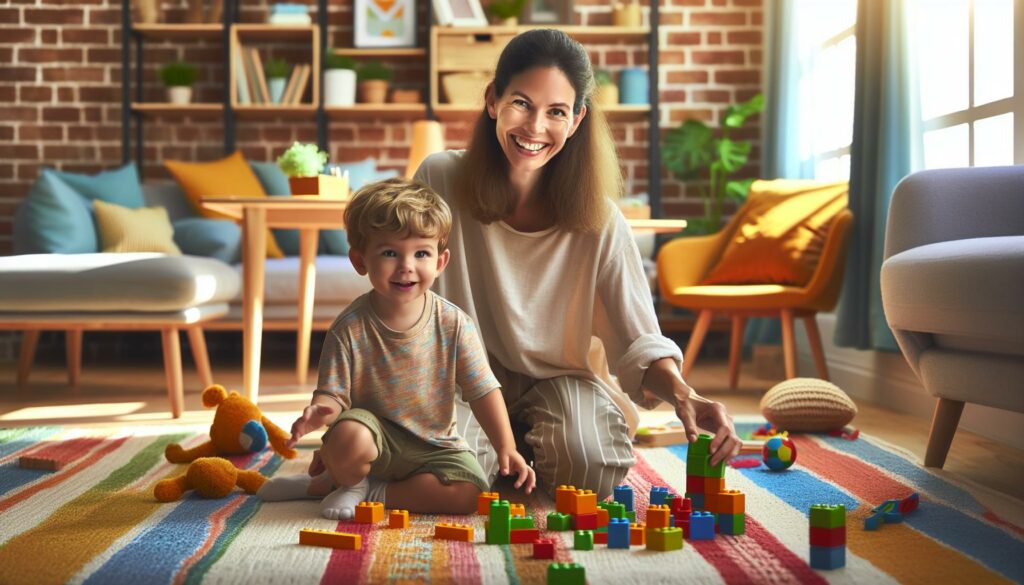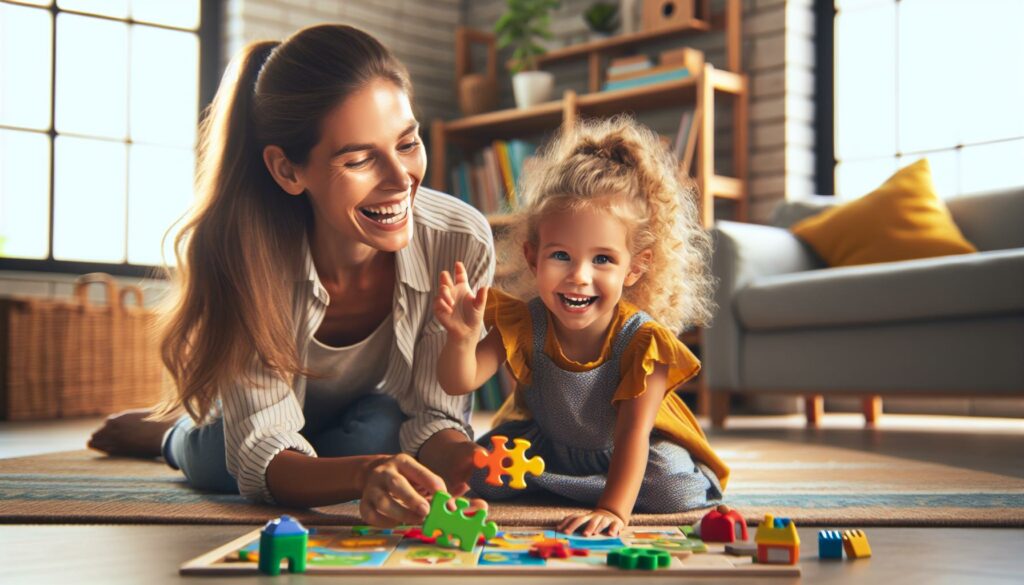Navigating the world of toddler parenting can feel like a rollercoaster ride. One moment your little one is giggling with joy, and the next, they’re throwing a tantrum over a toy. It’s an exciting yet challenging phase that demands patience, creativity, and a sprinkle of humor. I’ve learned that having a few solid parenting tips for toddlers can make all the difference in maintaining your sanity while nurturing your child’s growth.
In this article, I’ll share some effective parenting tips for toddlers. These parenting tips for toddlers are designed to foster positive behavior, encourage learning, and strengthen the bond between you and your child. Whether you’re a new parent or looking to refresh your approach, these insights will help you embrace the joys and challenges of raising a toddler with confidence.
Key Takeaways
- Understand Toddler Development: Familiarize yourself with key milestones in motor, language, cognitive, and social skills to better support your child’s growth during this critical stage.
- Promote Emotional and Social Growth: Recognize the importance of emotional expression and social interaction, fostering behaviors like empathy and cooperation while managing the challenges of independence.
- Implement Effective Communication: Utilize open-ended questions and active listening strategies to encourage your toddler to express themselves, strengthening your parent-child bond.
- Adopt Positive Discipline Techniques: Set clear boundaries and reinforce good behavior through praise and small rewards to create a supportive environment for learning acceptable behaviors.
- Create a Safe and Stimulating Environment: Childproof your home and choose age-appropriate toys to ensure safety while promoting exploration, creativity, and development.
- Establish Healthy Routines: Prioritize consistent meal times and sleep schedules to provide stability and security, helping your toddler develop emotionally and physically.
Parenting Tips for Toddlers
Understanding toddler development is crucial for effective parenting. It provides insight into what to expect during this busy stage of life and helps parents support their child’s growth.
Key Milestones
Key milestones indicate a toddler’s physical, cognitive, and language development. Between ages 1 and 3, toddlers typically achieve the following milestones:
- Motor Skills: By 15 months, most toddlers walk alone, often exploring their environment. By age 2, many run, climb, and throw.
- Language Skills: At 18 months, toddlers often use 10-25 words. By age 2, they typically combine two words to form simple sentences.
- Cognitive Skills: By age 1, many toddlers can point to objects and identify them. By age 2, they recognize shapes and colors and engage in basic problem-solving.
- Social Skills: By age 2, toddlers show a growing interest in playing with peers, often engaging in parallel play.
Familiarity with these milestones helps gauge a child’s development and identify areas needing support.
Emotional and Social Growth
Emotional and social growth plays a vital role in a toddler’s development. During this stage, toddlers begin to express their feelings and develop social skills. Key aspects include:
- Emotional Expression: Toddlers express emotions like joy, frustration, and fear, often leading to tantrums or outbursts.
- Empathy Development: By age 2, toddlers start showing empathy, often comforting others in distress, although their understanding is still limited.
- Social Interaction: Interaction with peers becomes crucial. Toddlers often engage in activities alongside others, learning sharing and cooperation.
- Independence Seeking: As they grow, toddlers assert their independence, making choices and asserting preferences, which can lead to a struggle for control.
Recognizing these elements of emotional and social growth allows for proactive parenting tips for toddlers that promote healthy interactions and emotional well-being.
Effective Communication Strategies
Effective communication forms the foundation of a strong parent-child relationship. By utilizing specific strategies, I can encourage my toddler to express themselves and foster a deeper connection.
Encouraging Expression
Encouraging expression allows toddlers to articulate their feelings and thoughts. I use open-ended questions like, “What did you like about today?” or “How does that make you feel?” to inspire dialogue. Providing a safe environment for my toddler to express emotions without judgment supports healthy emotional development. I also model expressive language myself, using varied vocabulary and gestures to demonstrate how to share feelings effectively.
Active Listening Techniques
Active listening involves more than just hearing words. I focus on my toddler’s verbal and non-verbal cues. I maintain eye contact, nod in understanding, and repeat back what they say to show that I’m engaged. This practice reinforces their willingness to communicate. Additionally, I minimize distractions during conversations, ensuring my toddler feels valued and heard, which strengthens our bond and enhances their confidence in sharing thoughts.
Positive Discipline Approaches
Positive discipline shapes behavior through constructive guidelines, allowing toddlers to understand expectations while fostering a supportive environment.
Setting Boundaries
Setting boundaries provides toddlers with safety and structure. Clear limits help them feel secure and understand acceptable behavior. Utilize simple language, repeat guidelines consistently, and involve them in discussions about rules. For instance, explain why touching sharp objects is not allowed. When they encounter boundaries, calmly reinforce these limits while ensuring to acknowledge their feelings. This approach promotes respect for rules and understanding consequences.
Reinforcing Good Behavior
Reinforcing good behavior encourages toddlers to repeat positive actions. Acknowledge their achievements with specific praise, like “”Great job putting away your toys!”” Use small rewards, such as stickers, to motivate them. Focus on reinforcing desired behaviors consistently rather than only addressing negative actions. Highlight examples of good behavior during playtime and family activities, making it clear that positive actions lead to enjoyable experiences. This strategy enhances their self-esteem and motivates continued compliance.
Creating a Safe and Stimulating Environment
Creating a safe space for toddlers is crucial for their development and exploration. Ensuring the environment is conducive to both safety and stimulation promotes learning and growth.
Childproofing Your Home
Childproofing the home helps prevent accidents and allows toddlers to explore freely. Start by securing heavy furniture to the wall, installing safety gates at stairs, and using outlet covers. Remove small objects from accessible areas, as they can pose choking hazards. Store cleaning supplies and medications out of reach or in locked cabinets. Ensure that sharp objects, like knives and scissors, are stored safely. Use corner guards on furniture to prevent injuries and choose non-toxic materials for toys and decor. Regularly inspect the home for new hazards as the toddler grows and becomes more mobile.
Choosing Age-Appropriate Toys
Choosing age-appropriate toys fosters safe and effective learning experiences. Look for toys that match the toddler’s developmental stage, promoting physical, cognitive, and social skills. Select toys that encourage creativity, such as building blocks and art supplies. Opt for toys that promote imaginative play, like dolls, vehicles, or kitchen sets. Ensure toys are free of small parts that can be choking hazards and check for safety certifications. Engage toddlers with toys that develop fine motor skills, such as puzzles and stacking games. Rotate toys periodically to maintain interest and encourage exploration.
Building Healthy Routines
Establishing healthy routines for toddlers promotes stability and security. Consistent daily habits help toddlers learn what to expect, fostering a sense of comfort and well-being.
Meal Times and Nutrition
Meal times serve as a critical opportunity for nutrition and bonding. I prioritize a balanced diet rich in fruits, vegetables, whole grains, and proteins. Serving small portions encourages toddlers to explore new foods without feeling overwhelmed. Using positive language around food creates a pleasant experience and fosters curiosity. I offer snacks between meals to ensure toddlers receive the necessary energy for play and growth. Mealtime routines, such as sitting together at the table, enhance social interactions and modeling healthy eating habits. Providing choices, like selecting between two vegetables, promotes independence while encouraging better eating habits.
Sleep Schedules
A consistent sleep schedule is vital for toddler health and development. I aim to establish a calming bedtime routine that signals the transition from active play to rest. Activities like reading or gentle play help toddlers wind down. I choose a consistent bedtime, aiming for 11 to 14 hours of sleep each night, including naps. Creating a comfortable sleep environment, such as a darkened room with a comfortable mattress and soothing sounds, enhances sleep quality. Limiting screen time at least one hour before bed reinforces healthy sleep patterns. By adhering to these routines, I promote not only restful sleep but also emotional stability and readiness for daily activities.
Parenting a Toddler
Embracing the journey of parenting toddlers is both rewarding and challenging. By implementing the strategies I’ve shared, you can create a nurturing environment that promotes your child’s development and strengthens your bond.
Remember to be patient and flexible as you navigate this dynamic stage. Each day brings new opportunities for learning and growth for both you and your toddler.
Fostering open communication and setting clear boundaries will not only help your child feel secure but also empower them to express themselves. With the right tools and mindset, you can confidently guide your toddler through these formative years, making lasting memories along the way.



